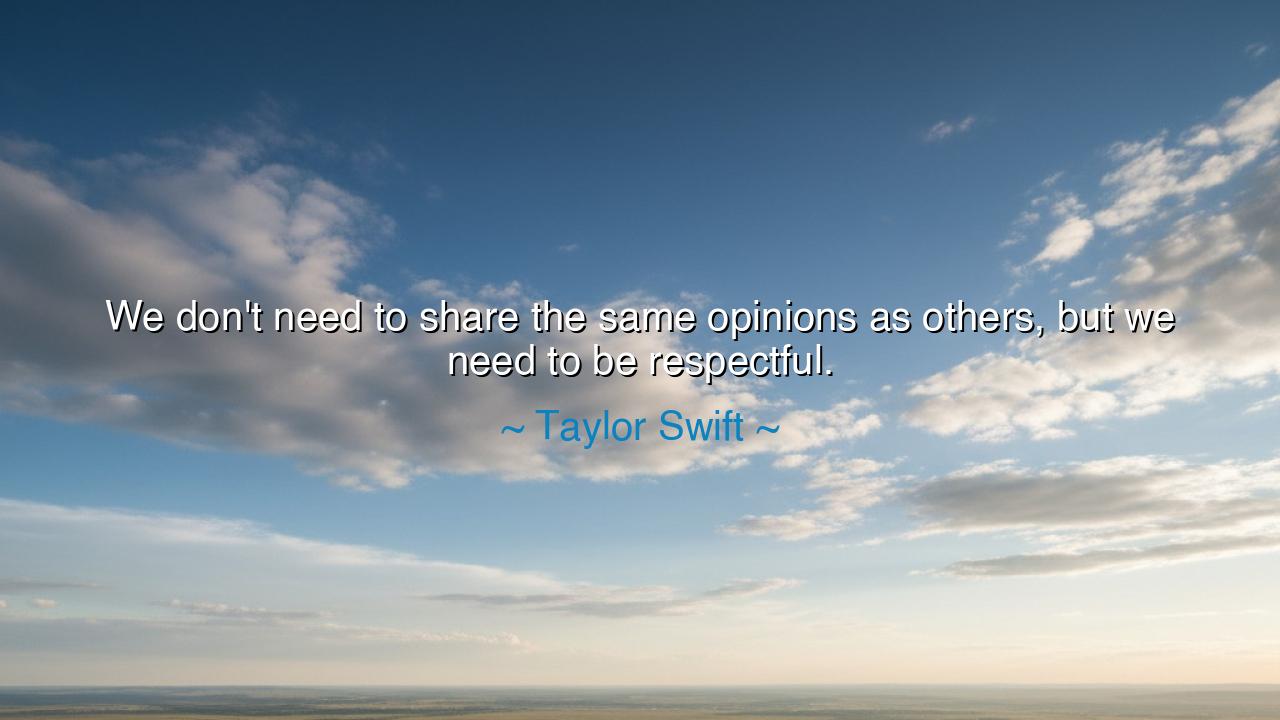
We don't need to share the same opinions as others, but we need






The words of Taylor Swift, “We don’t need to share the same opinions as others, but we need to be respectful,” carry the quiet authority of wisdom clothed in gentleness. They speak to one of the oldest struggles of humanity: the tension between difference and unity. To hold different opinions is the natural state of mankind—no two hearts beat with the same rhythm of thought, no two minds see the world through the same glass. Yet to remain respectful amidst this diversity is the highest calling, for respect is the bridge that allows us to stand together without erasing what makes us unique.
To demand uniformity of thought is to enslave the soul, to silence the divine spark of individuality that makes humanity rich. Yet to dismiss respect in the face of difference is to invite chaos, conflict, and endless division. Taylor’s words remind us that peace and dignity are not born from agreement, but from the discipline of honoring one another even when our beliefs diverge. Respect is not surrender—it is strength. It is the recognition that another’s humanity matters more than winning an argument.
The ancients too proclaimed this truth. In the dialogues of Plato, Socrates often encountered men who disagreed with him sharply, yet he treated their opinions as worthy of examination rather than contempt. In the East, the teachings of the Buddha urged compassion for all beings, reminding disciples that even those who oppose us deserve gentleness. And in the scriptures of many faiths, respect is lifted as the foundation of justice, for without it no community can endure. Thus, Swift’s words echo timeless wisdom: unity is not sameness, but harmony amid difference.
History offers vivid examples. Consider Abraham Lincoln during the years of civil strife. He was surrounded by men of opposing views—some who sought vengeance, others who sought compromise. Yet Lincoln spoke often of “malice toward none, with charity for all.” He did not demand that enemies think as he thought, but he urged respect, knowing that without it the nation would remain forever divided. His leadership showed that respect for those who differed was not weakness, but the path to healing.
By contrast, when respect fails, discord consumes societies. Revolutions soaked in cruelty and contempt often destroy not only rulers but the very fabric of a people. When men see opponents not as fellow humans but as enemies undeserving of dignity, no common ground can be found. In such soil, hatred grows. Swift’s words warn against this ancient danger, teaching us that respect must be upheld, lest difference become destruction.
The heart of this teaching is both simple and profound: respect is the guardian of peace. It allows friends to debate without breaking bonds, neighbors to differ without hostility, nations to coexist without war. To respect does not mean to agree; it means to honor the humanity of the other, even when the mind cannot follow their thought. It means holding truth with conviction while still granting kindness to those who hold it differently.
The lesson for us is clear: cherish your own opinions, but do not wield them as weapons. Speak your truth, but never with scorn. When others disagree, listen first, for listening is the seed of respect. Remember always that the worth of a person does not rise or fall on whether they echo your voice. Let respect guide your tongue and your actions, for in it lies the true strength of character.
Practical actions follow. In your daily life, pause before reacting in anger to difference. Practice the art of listening with patience, even to those you oppose. On matters of debate, speak firmly yet with gentleness, seeking understanding rather than victory. Teach children that respect is not weakness, but nobility. In every conversation, remember Swift’s words, and let them temper your speech with kindness.
Thus the quote endures as a law for all generations: “We don’t need to share the same opinions as others, but we need to be respectful.” In these words lies the key to harmony amid diversity, peace amid conflict, and dignity amid disagreement. Let them be written upon the heart, so that even when voices clash, the bond of respect may keep humanity whole.






AAdministratorAdministrator
Welcome, honored guests. Please leave a comment, we will respond soon